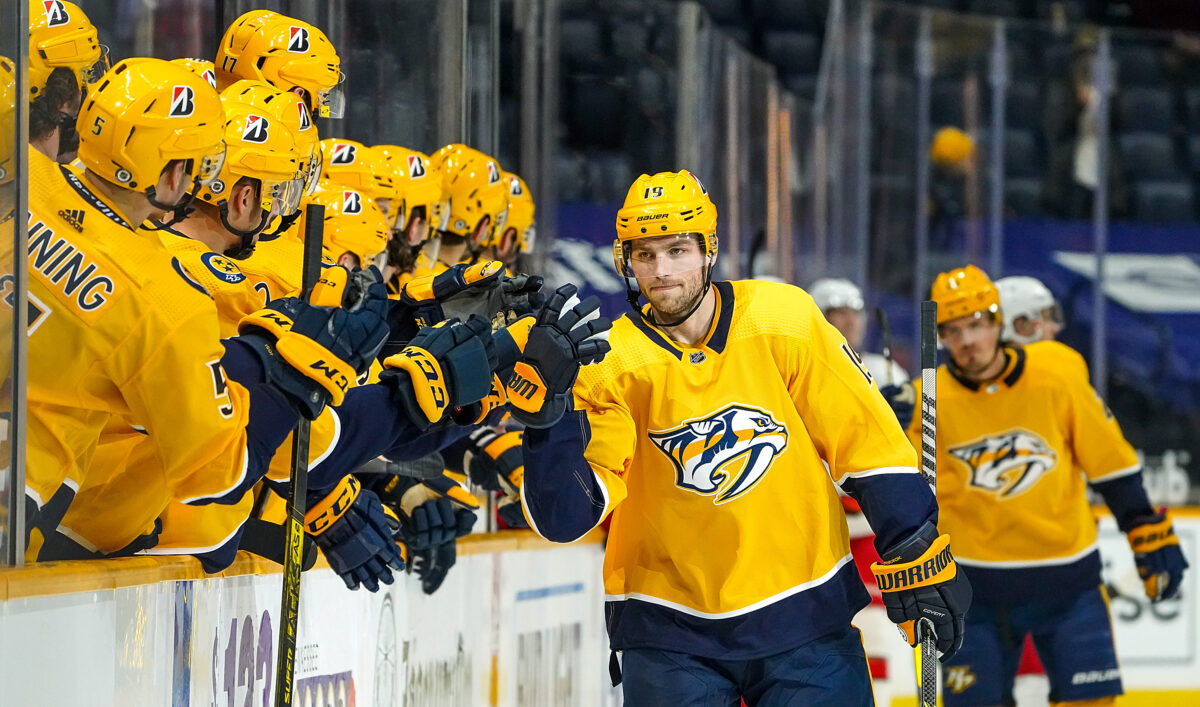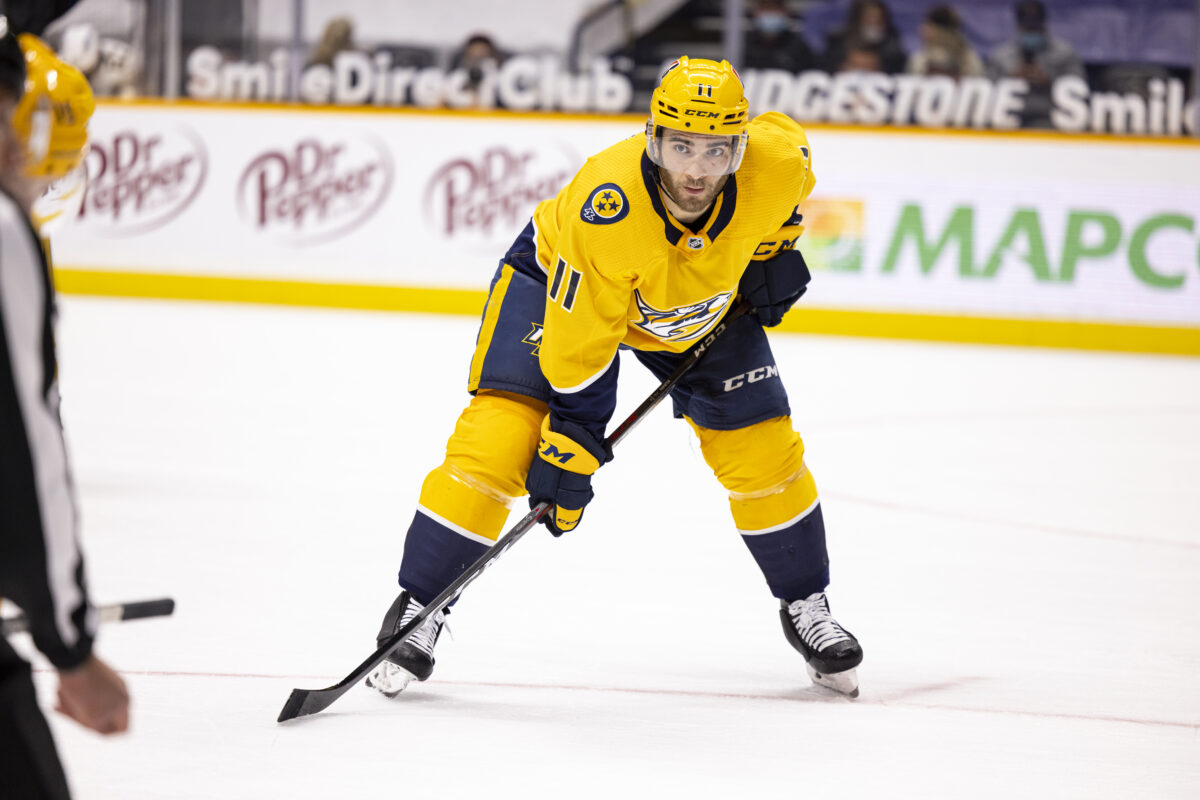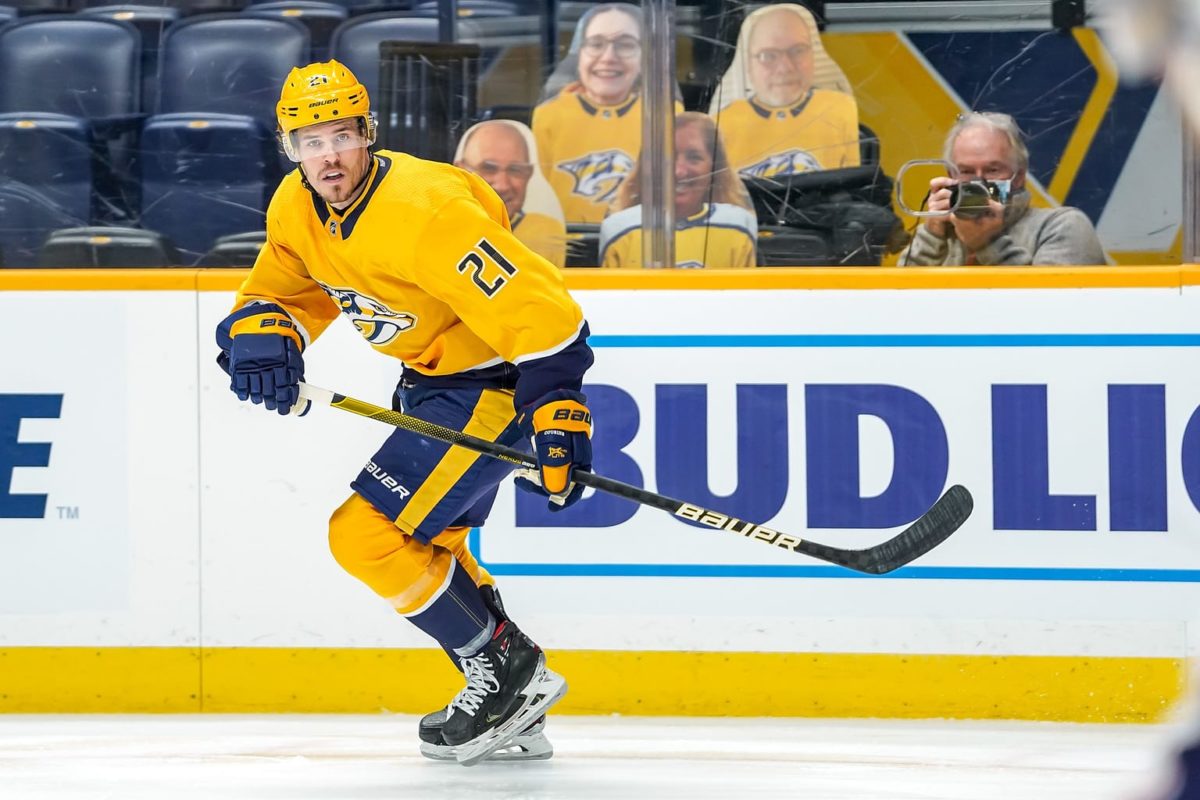In the previous edition of the Nashville Predators 2020-21 report cards, I looked over the young players that were brought in during the crucial periods full of injuries. In this article, I will still be looking at some relatively young guys, but not initially dubbed as part of the “youth movement” that general manager David Poile spoke about before the season start. All of the players I’ll be going over today spent time with one another on lines, especially towards the end of the season.
Calle Jarnkrok
Jarnkrok burst onto the scene early in the season. He was on pace to shatter his best regular-season point total in an entire season, as he hit 28 in 49 games. Through his first 25 games, he had 15 points in total, but nine of them were goals, which was second on the team at that point. He was only behind Filip Forsberg in six fewer games. He was shooting lights out and creating so many opportunities for himself through strong forechecking and defense that he ended up being a dark horse for the Selke Trophy. Jarnkrok wasn’t allowing high-danger chances mainly because of his tenacity and forcing players to stumble around with the puck in the defensive and neutral zones. As some like to say, the best defense is the best offense.

As for the playoffs, he disappeared. He had one assist in five games and didn’t make that much of an impact. There were times that fans and commentators could see him forechecking hard just as he always does, but he wasn’t there in terms of impact on the scoresheet or analytically. He had a 40.17 expected goals for percentage (xGF%) for the series, per Evolving-Hockey, which is well below average. The eye test supported that as well.
Jarnkrok had a solid season, and when he was promoted in the lineup, he showed that he does have the ability to score. The second line that coach John Hynes made up of Mikael Granlund and Luke Kunin, who I’ll be overviewing momentarily, was excellent offensively down the stretch. However, their line’s disappearance in the playoffs was due primarily to Jarnkrok not being a catalyst and riding a high shooting percentage like he was during the regular season.
Overall grade: B
Luke Kunin
On the day of the 2020 NHL Entry Draft, the Predators made a trade to acquire Kunin from the Minnesota Wild for Nick Bonino and picks. There were some mixed reactions, as Bonino was beloved by both the Predators team and fans. However, the team needed to get younger, and Kunin could provide that while also bringing some solid skill that Minnesota didn’t exactly utilize. While there were some concerning stretches from him during the regular season, he scored the fifth-most goals on the team, tied with Viktor Arvidsson and Rocco Grimaldi. He didn’t wrack up many points, but he seemed to find his stride with Jarnkrok and Granlund towards the end of the season.

However, the playoffs were not kind to him. The only two points he scored, albeit significant during the time, were in Game 4. The biggest goal was his second, as it won the Predators the game in double overtime and tied the series at two games apiece. Outside of that game, he was essentially nonexistent. He didn’t create very many high-danger chances, nor was he on the receiving end of them. Up until Game 4, many fans were clamoring that he needed to get it going because there wasn’t much being left out on the ice.
Kunin, for his first season with a new team, performed adequately. I’m sure he would’ve liked to perform better during the playoffs, as we all wish he did too, but it wasn’t a bad season by any means. There isn’t really much to overview here, as his totals were pretty pedestrian. However, with a full and hopefully normal season to come, it wouldn’t be a surprise to see him up his performance.
Overall grade: B-
Mikael Granlund
Granlund was a scorching topic halfway through the season. With the Predators struggling to win games against even the worst teams in the Discover Central Division and his contract set to expire in the upcoming offseason, there were many rumors that the Preds would sell him at the trade deadline. Poile refused to sell him and Craig Smith last season, and we saw Smith walk as a result. Fans didn’t want him to make that mistake again. He ended up not selling Granlund, and it proved to be well worth it, as he ended putting up the fourth-most points on the team with 27. He also looked excellent towards the end of the season, like his linemates. Their chemistry was excellent, and they continuously put pressure on the opponents offensively.

As for the playoffs, Granlund seemed to be the only member of the line that didn’t disappear entirely. He put up a total of five points, which tied for first with Ryan Ellis. Granlund had two goals, both of which came at significant times in big games. He continued being a pest on the forecheck for the Predators, despite having a rather below average xGF% at 43.99 percent.
Latest Predators Content:
- Looking Back on Tom Fitzgerald’s Nashville Predators Tenure
- 9 NHL Teams That Missed in Free Agency
- Get to Know New Nashville Predator Jonathan Marchessault
- Peter “Foppa” Forsberg: A Biography
- Get to Know New Nashville Predator Steven Stamkos
Granlund had a good season that had lots of outside distractions. He was a steady presence on the second line and showed up in the playoffs when the team needed him. He’s one of the better passers on the team, and that showed throughout the regular season and playoffs. It will be interesting to see the direction that the front office goes and whether or not they decide to re-sign him.
Overall grade: B+
Nick Cousins
Nick Cousins is a fun player. He’s skilled, plays above-average defense, can contribute to the offense, and loves being a nuisance when he’s on the ice. I loved the pickup over the offseason, and I still love it today. He bounced around the lineup but found his living on the third line with Erik Haula and other players being shuffled in and out. He only put up 18 points in 52 games but played the kind of hockey expected of him when the season began. He made everyone mad and chipped in on both ends, just like the Predators asked. One of the most notable and hilarious events of the entire season was Cousins provoking Florida Panthers star forward Jonathan Huberdeau into getting a penalty after jawing with him for about three minutes. Even though his xGF% was 49.11 percent, and his other stats aren’t overwhelmingly great, it’s clear that he offered much more.

As for the playoffs, he did manage to score some big goals after being slotted in before Game 3. He had two points and two goals in the four games that he played, but he did manage to help lead the charge when the Predators controlled the puck. He went to the front of the net and got an excellent deflection goal and a big tap-in goal to open the scoring in Game 6. He didn’t do anything that was highlight-reel material, and he didn’t put up a ton of points. However, he didn’t make any plays that cost the Predators, and that’s all you can ask.
Cousins had an alright season full of line shuffling and not-so-stable chemistry. He played about average in both ends, excelling in some areas more than others, but Poile brought him in to be the sandpaper. He did much better than previous players in that role have done while scoring more and providing more offense outside of the scoresheet. He wasn’t great, but not bad enough to warrant anything around a C.
Overall grade: B-
Despite not showing up in full force during the playoffs, these four guys were all contributing factors in one way or another to the Predators’ big resurgence. They all know how to play a hard-nosed style of hockey that fans can enjoy on a night-to-night basis. Whether or not they will be here following the expansion draft remains to be seen, but I’d be willing to bet that most fans would be excited to have them back.